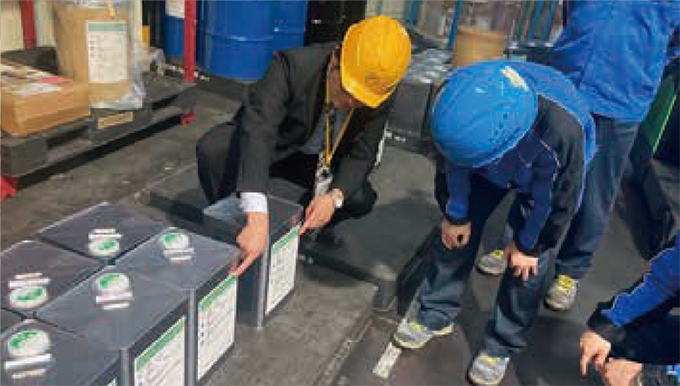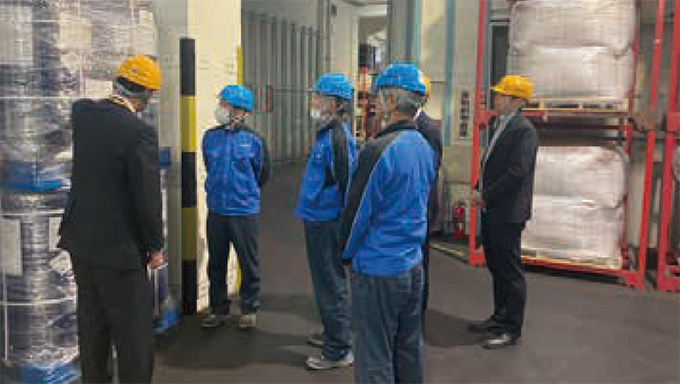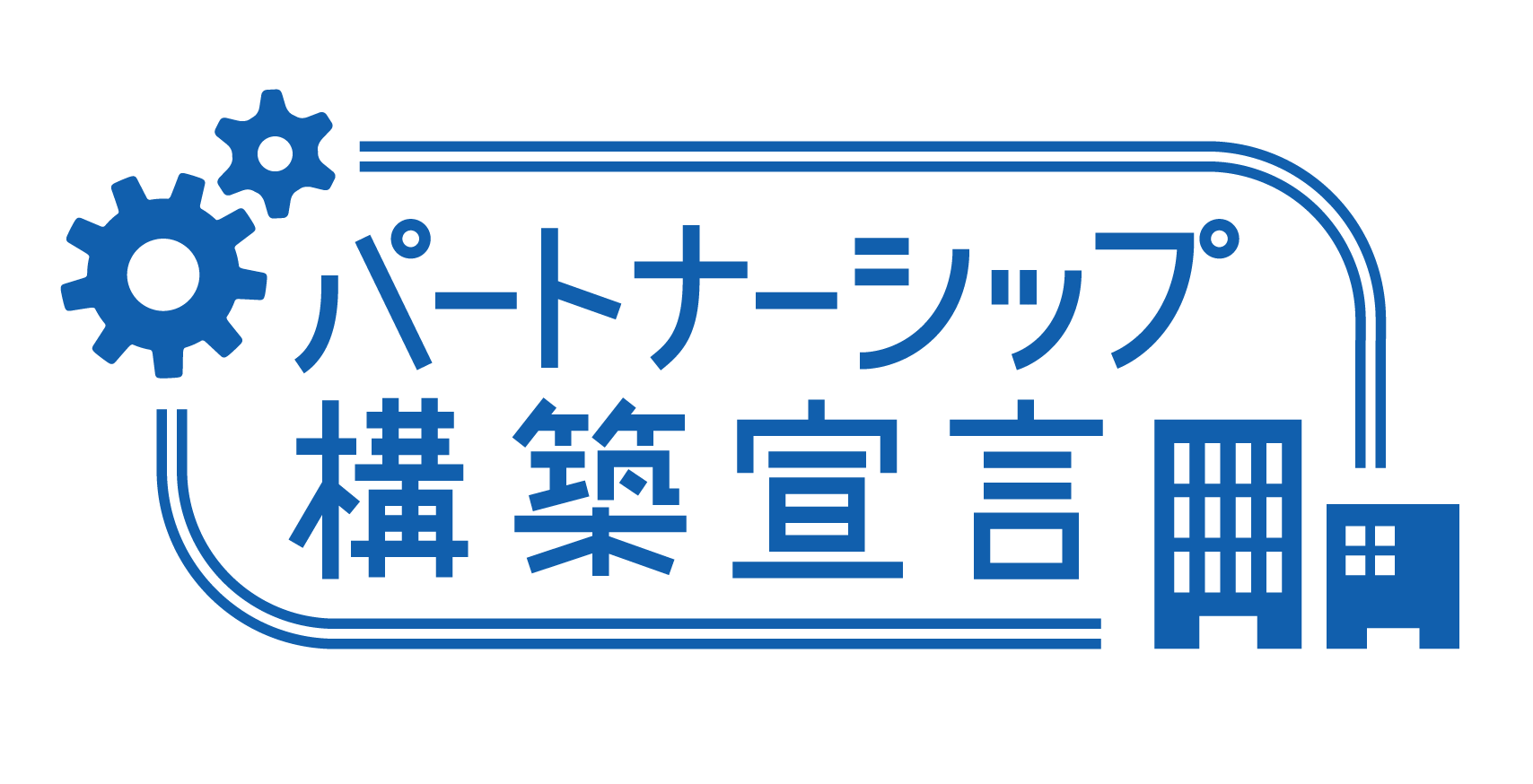Together with Our Business Partners
(Fair Operating Practices)
At the Nippon Soda Group, compliance and other matters to ensure the execution of sound corporate activities are set forth in the Nippon Soda Group Code of Conduct, and we strive for thorough compliance with laws and ordinances. Furthermore, in addition to conducting fair and impartial transactions as a member of international society, we aim to build a sustainable supply chain that is both environment- and society-friendly based on constructive dialogue with our business partners.
- Interaction with our business partners with good sense and integrity, and engagement in fair and impartial transactions.
- Regarding the procurement of raw materials and other purchasing activities, maintaining stable relationships of trust with our business partners based on our purchasing policy.
Initiatives in Purchasing
Purchasing policy
- Thoroughly comply with purchasing laws and ordinances (Antimonopoly Law, Act against Delay in Payment of Subcontract Proceeds, Etc. to Subcontractors, etc.). Participate in internal and external training regarding law and ordinance expertise. Select suppliers who comply with laws, regulations, and social norms in each country and region.
- Purchase raw materials that contribute to stable production and enhanced cost competitiveness.
- Promote environment- and society-friendly raw material procurement.1,2
- Secure multiple material procurement sources and undertake appropriate inventory management to ensure a robust business continuity plan (BCP).
-
1. Environment friendly
Includes the promotion of climate change countermeasures, including the reduction of GHG emissions; the prevention of environmental pollution; the protection of global and regional environments, including the maintenance of biodiversity and ecosystems; the promotion of resource- and energy-saving measures; and the reduction of waste. -
2. Society friendly
Includes the elimination of child labor, forced labor, excessive labor, and discrimination; respect for freedom of association and the right to collective bargaining; the protection of workers’ rights, including matters related to equal opportunity, minimum wage, and living wage; and the guarantee of safe, hygienic workplace environments.
The Nippon Soda Group Code of Conduct
At the Nippon Soda Group, we ensure thorough compliance with the Nippon Soda Group Code of Conduct, which outlines the following standards for transactions with suppliers.
- When selecting a supplier from among multiple vendors, we determine the most appropriate business partner by comparing and assessing quality, price, delivery period, technical capability, supply stability, and other criteria in a fair and just manner.
- When outsourcing manufacture to an external business, we only conclude contracts and complete transactions following thorough understanding of the Act against Delay in Payment of Subcontract Proceeds, Etc. to Subcontractors.
Cooperative purchasing activities
We engage in purchasing activities while checking the safety and environmental and social impact of our chemical products from manufacture to delivery. This includes collecting information from trading companies, who serve as intermediaries, and on-site audits alongside the quality control departments of each of our plants.
Through the exchange of diverse information, we are working to build relationships with our business partners that facilitate mutual development, and aiming to ensure sustainable procurement activities by cultivating deeper cooperation and understanding of our Purchasing Policy.
Raw material quality management
- We regularly visit suppliers of pharmaceutical raw materials to conduct GMP* audits.
- For all other raw materials, we implement regular paper-based audits of our suppliers, and check whether there have been any changes to product standards, manufacturing processes, and raw materials used from the details in the purchase specification sheet.
- * When manufacturing pharmaceuticals, not only is it important to check conformity with predetermined quality standards, the manufacturing process itself must be appropriately managed to ensure constant manufacture of outstanding, high-quality products. Good Manufacturing Practices (standards for pharmaceutical manufacturing and quality management) are a set of conditions for the manufacture of high-quality pharmaceuticals.
Environment- and society-friendly supply chain
- The Nippon Soda Group has formulated the Sustainable Procurement Guidelines with the aim of promoting understanding of our Group’s policies and values among our suppliers, and collaborating with them to address social issues. These Guidelines are for the following themes.
- From a sustainability standpoint, when procuring industrial salt and pulp, two of our main natural raw materials, we monitor our suppliers (document-based and on-site monitoring) in order to confirm the following.
- ①Compliance with laws and ordinances, and social norms, and fair transactions
- a.Compliance with relevant laws and ordinances, and social norms
- b.Compliance with in-house rules related to business entertainment and gifts, and prevention of bribery and other forms of corruption
- c.Appropriate management of confidential and personal information stemming from transactions
- ②Environmental considerations
- a.Protection of natural ecosystems and global and regional environments
- b.Prevention of environmental pollution
- c.Promotion of efforts to reduce GHG emissions and tackle climate change
- d.Promotion of resource- and energy-saving measures
- e.Reduction of waste
- ③Social considerations
- a.Coexistence with regional communities and efforts to contribute to society
- ④Support for human rights and protection of workers’ rights
- a.Provision of safe, hygienic workplace environments
- b.Elimination of child and forced labor and discrimination
- c.Respect for workers’ rights through appropriate management of wages and working hours, etc.
- ⑤Material traceability
- a.Materials are not illegally picked or the result of illegal deforestation
- b.Materials are not associated with serious social conflicts
- The fulfillment rate* in the FY 2022 monitoring of our suppliers was 97.9%.
| (1)Compliance with laws, ordinances, and corporate ethics (2)Anti-corruption (3)Fair and impartial transactions (4)Protection of intellectual property (5)Information security (6)Conflict minerals (7)Internal control (8)Reporting system (9)Prohibition of insider trading (10)Prohibition of conflicts of interest (11)Environmental management system (12)Climate change countermeasures (13)Effective use of resources (14)Chemical substance management (15)Air, water, and soil conservation (16)Preservation of biodiversity (17)Waste reduction (18)Quality and safety assurance (19)Ensuring business continuity (20)Stakeholder collaboration (21)Prohibition of forced labor (22)Prohibition of child labor (23)Prohibition of discrimination (24)Prohibition of harassment (25)Respect for the right to collective bargaining (26)Management of appropriate wages and working hours (27)Safety and health assurance (28)Contribution to society and regions (29)Protection of privacy |
- * Fulfillment rate is calculated based on the average values for each question from each company, based on a five-point scale related to the status of initiatives in place. Five (sometimes four) is the highest and equates to 100%, and one is the lowest and equates to 20% (sometimes 25%).
Dialogue with Business Partners
Improve awareness on safety and disaster prevention together with our partner companies
We provide education on the safe use of agricultural machinery to companies to whom daily field maintenance is consigned at various agricultural fields under the jurisdiction of the Odawara Research Center.
In cooperation with our partner companies, we aim to achieve zero accidents by involving all relevant people. We implement various measures to raise awareness on safety and disaster prevention among employees of partner companies who work within our facilities, such as the development of a list that clarifies who has qualifications for operating agricultural machinery and equipment and the management of operations.
Educating transportation companies on logistics safety
The Nippon Soda Group regularly provides education targeting transportation companies. Our programs not only provide training to prevent accidents caused by our workers and during transport, but also information on past complaints regarding logistics. We share such information to ensure the safe delivery of our products to our customers.


Logistics safety education
(education on product storage and handling)
(Kawasaki Distribution Center, Sanwa Soko Co., Ltd.,
November 30, 2023)
Declaration of Partnership Building
As we aim to create a sustainable supply chain, at Nippon Soda we are engaging in constructive dialogue with our business partners to promote environment- and society-friendly business activities.
Moreover, we are working with our supply chain business partners and value creation companies to ensure “co-existence and co-prosperity,” and as part of the Declaration of Partnership Building, announcing our key measures to build new partnerships.
- *Declaration of Partnership Building
https://ssl4.eir-parts.net/doc/4041/ir_material3/192602/00.pdf(Japanese version only)



